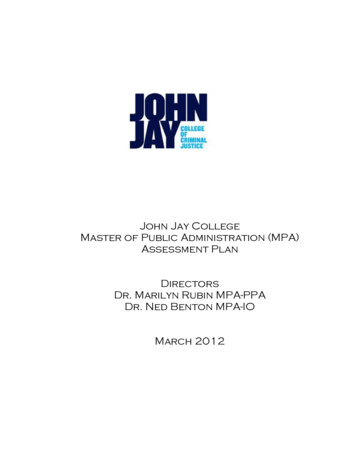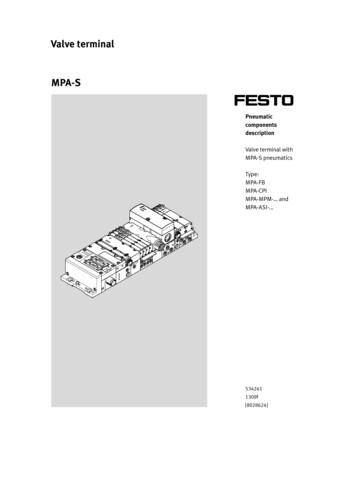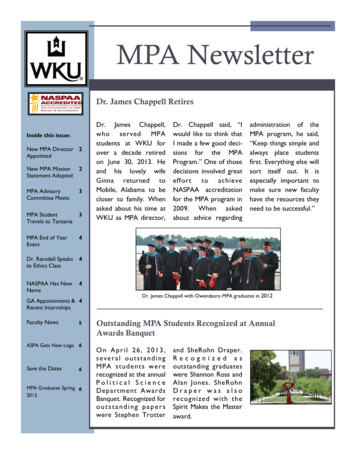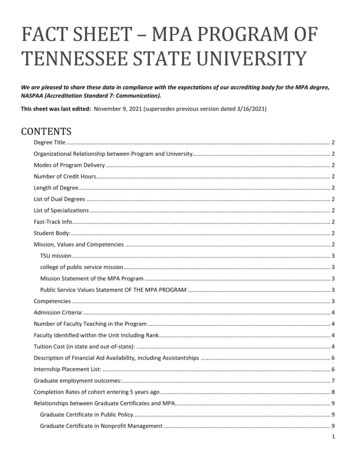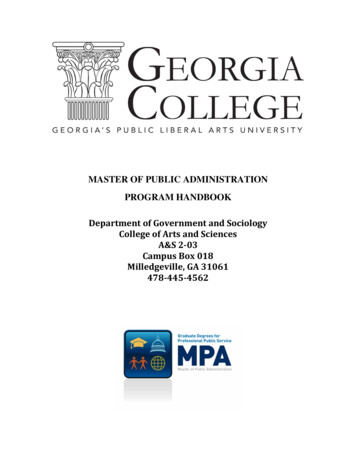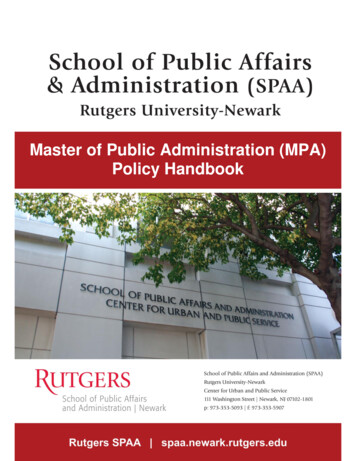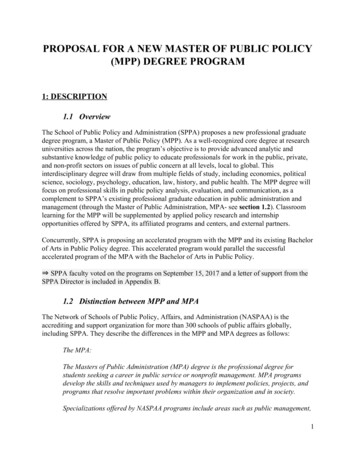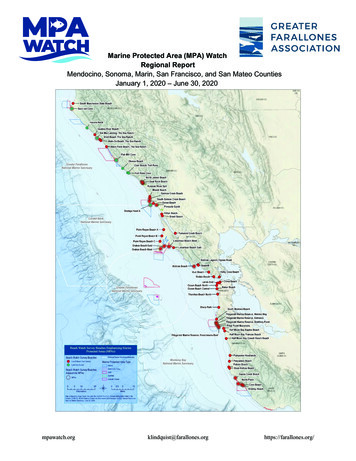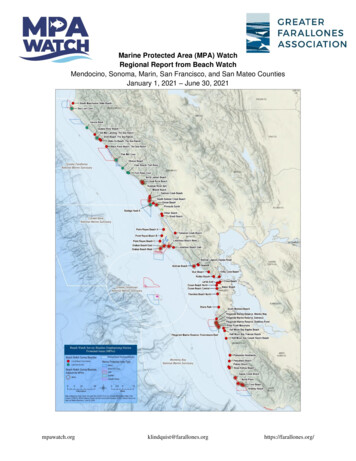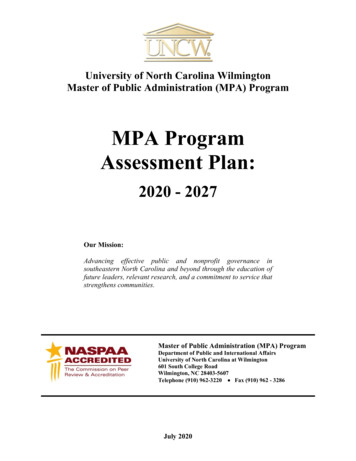
Transcription
University of North Carolina WilmingtonMaster of Public Administration (MPA) ProgramMPA ProgramAssessment Plan:2020 - 2027Our Mission:Advancing effective public and nonprofit governance insoutheastern North Carolina and beyond through the education offuture leaders, relevant research, and a commitment to service thatstrengthens communities.Master of Public Administration (MPA) ProgramDepartment of Public and International AffairsUniversity of North Carolina at Wilmington601 South College RoadWilmington, NC 28403-5607Telephone (910) 962-3220 Fax (910) 962 - 3286July 2020
MPA Program Assessment PlanMPA FacultyProgram AdministrationUNCWEmailOfficeExtRaymonde Kleinberg, Chair of PIAkleinbergrLH 27024254Mark T. Imperial, MPA Director & ProfessorimperialmLH 26727928Elizabeth Carter, PIA Administrative AssistantcartereLH 26827434Conswalia Green, PIA Administrative AssistantgreencLH 26823220Jennifer Biddle, Associate ProfessorbiddlejLH 26122187John Brennan, Associate ProfessorbrennanjLH 116 B27930Jeffrey Brudney, Betty and Dan Cameron FamilyDistinguished Professor of Innovation in the NonprofitSectorbrudneyjLH 255 A23920H. Daniel Heist, Assistant ProfessorheistdLH 26420562Kirsten Kinzer, Assistant ProfessorkinzerkLH 25722809Christopher Prentice, Associate ProfessorprenticecrLH 255B22135MPA FacultyPart-time Lecturers from the CommunitySarah Daniels, LecturerN/AAnnie Garriga, LecturerN/AAnthony Prinz, LecturerN/A-i-
MPA Program Assessment PlanTable of ContentsMPA FacultyTable of ContentsAbout This Assessment PlanMission Driven Assessmentiiiiii1Student Learning Outcomes3Concentration Learning Outcomes6Program Outcomes8Managing our MPA Program Strategically12MPA Program’s Annual Assessment Process14Collecting Data to Assess Student Learning Outcomes16Scoring the Rubrics18Collecting Data on Program Outcomes18Analysis & Reporting19Appendix A: Assessing Student Learning OutcomesAppendix B: Assessing Program OutcomesAppendix C: Student Learning Outcome Assessment ScheduleAppendix D: Rubrics Used to Assess Student Learning Outcomes- ii -A1B1C1D1
MPA Program Assessment PlanAbout This Assessment PlanThe MPA Program’s Assessment Plan: 2020 - 2027 replaces our previous plan adoptedin October 2012. It describes our on-going and planned assessment activities conducted pursuantto the accreditation standards of the Network of Schools of Public Policy, Affairs, andAdministration’s (NASPAA’s) and the Southern Association of Colleges and Schools (SACS).The Assessment Plan is organized into several sections. The first describes ourcommitment to mission driven assessment. It discusses the development of our missionstatement, how it has changed over time, and the public values reflected by our deliberate use ofterminology. It then summarizes our student learning outcomes (i.e., learning competencies) andtheir relationship to our mission statement. The Assessment Plan also discusses the differentways our concentrations reflect our mission statement and identifies our concentration-basedlearning outcomes. The section concludes by describing the program outcomes designed toreflect UNCW’s strategic goals, NASPAA’s accreditation standards, and our mission statement.The second section describes our commitment to managing our program strategically.This is accomplished through our commitment to ongoing monitoring and assessment. Thesection describes the different sources of assessment data. It then describes how these data aremanaged and analyzed and the different reporting processes that ensure these results arecommunicated to our stakeholders.The document concludes with a series of Appendices. Appendix A describes the studentlearning competencies, where they are covered in our core courses or other courses in ourcurriculum. It also describes the indicators used to assess the competencies (components of therubric), the evidence collected, timing for assessment, and the general analysis and reportingprocess. Appendix B describes our program outcomes and their linkage to the MPA mission,NASPAA accreditation standards, and UNCW’s Strategic Priorities. It also describes the datacollected and monitored along with our outcome measures or goals and the general analysis andreporting processes. Appendix C presents the learning outcome assessment schedule and thetiming for assessing the core competencies and the assessment tools used every academic year.Appendix D contains the rubrics used in our assessment of student learning competencies.- iii -
MPA Program Assessment PlanMission Driven AssessmentMission Driven AssessmentThe MPA program’s curriculum conforms to the accreditation standards of the Networkof Schools of Public Policy, Affairs, and Administration (NASPAA). These standards are“mission-driven” and recognize that the curriculum of each MPA Program should reflect itsmission. Our original mission statement was developed in 2002 after considerable input fromMPA students, MPA faculty, and our MPA Community Advisory Board. The missioncommitted us to providing an interdisciplinary terminal professional degree designed to: Provide a broad education for individuals expecting to enter governmentand nonprofit institutions and who aspire to management positions;Enhance the capabilities and performance of those individuals currently inmanagement positions in southeastern North Carolina;Produce relevant public administration research; and,Provide active public service aimed at the support and improvement ofpublic administration and nonprofit management in southeastern NorthCarolina.In June 2009, the MPA faculty embarked on a strategic planning process triggered by aconfluence of events. Our MPA program had been existence for nearly 10 years, it was time tostart thinking about our future, and to begin laying the foundation for our next 10 years. Ourenrollments had grown to around 75 students. We had a growing base of over 150 alumni, someof whom were beginning to work their way up the career ladder and assume leadership positions.At the same time, the financial crisis combined with state budget cuts, tuition increases, andpressure to grow enrollments created strategic issues we needed to consider. We had also justcompleted our first assessment report pursuant to UNCW’s accreditation by the SouthernAssociation of Colleges and Schools (SACS). NASPAA had also initiated significant revisionsto its accreditation standards, which required that we specify additional learning and programoutcomes.These events created the backdrop for a strategic planning process marked by a series ofhalf and full day retreats that began in 2009 and involved numerous faculty meetings over thenext 3 years. During this process we examined all aspects of our program after receivingextensive input from our current students, alumni, and Community Advisory Board. Theproducts of this process included an MPA Student Handbook, Diversity Plan, revised missionstatement, new student learning outcomes, and the prior version of this Assessment Plan andrubrics. During every step of the process, we sought input from our students, alumni, andCommunity Advisory Board.In Spring of 2019, the MPA faculty and our MPA Community Advisory Board reviewed,edited, and reaffirmed our mission statement. We amended the mission to include the word“nonprofit” to better reflect our current and future strategic priorities. We believe that the corpusof the mission continues to provide a clear statement of our purpose and reflects the programoutcomes and student learning competencies we strive to achieve. The mission captures the core-1-
MPA Program Assessment PlanMission Driven Assessmentpublic service values embraced by our program and instill in our students and now reads:Advancing effective public and nonprofit governance in southeastern NorthCarolina and beyond through the education of future leaders, relevant research,and a commitment to service that strengthens communities. (Adopted 3/28/12;Amended 4/2/2019)The new mission statement remains focused on the needs of public and nonprofit organizationslocated in southeastern NC. We also recognize that some students will seek employment at thefederal, state, and local levels outside UNCW’s service region. We remain committed to servingboth pre-service and in-service students. Accordingly, we revised the mission to make moredeliberate use of terminology that reflects and reiterates the core public service values embracedby our program and reflected in our student learning competencies and program outcomes.One focus of our mission is “advancing effective public and nonprofit governance”. Useof the phrase “public and nonprofit governance” reflects our public service values ofinclusiveness, shared power and responsibility, public deliberation, consideration of differentvalues and perspectives, and the importance of being a good steward with public resources. Italso reflects our desire to enable our students to work effectively in policy and managementsettings and to manage and facilitate participative processes that involve diverse public andprivate sector actors. Accordingly, it is important that we expose our students to diverse views inthe classroom and for our students to interact with professionals inside and outside the classroomto expose our students to individuals who can model desirable public service values.Our use of the term “future leader” is also deliberate. We remain focused on serving theeducational needs of both pre-service students and in-service professionals who seek to advancetheir careers. We want our students, both pre-service and in-service, to aspire to be leaders intheir communities. This requires developing critical thinking skills and aspiring to do the “right”thing rather than just doing things right. Finally, our use of the phrase “commitment to servicethat strengthens communities” reflects our desire to develop students who not only want to beeffective managers, but who also are committed to strengthening the broad array of communityinstitutions through their service. It also illustrates our faculty’s commitment to strengtheningour community through efforts including, but not limited to: Academic and applied research that helps advance our understanding of effectivepublic governance and stronger communities and institutions;Modeling public service values through service to our communities and professions;Utilizing class service projects, capstone projects, internships, and fellowships tobenefit and strengthen community organizations in various ways;Encouraging our students to volunteer and get involved in community programs toadvance their commitment to public service and share these values with others in ourcommunity;Training current and future community leaders through the Academy of StrategicManagement and UNCW’s CPE to build capacity in public and nonprofitorganizations throughout our region;Grant and contract work that helps community organizations develop more effective-2-
MPA Program Assessment Plan Mission Driven Assessmentpolicies and programs that allows them to be better stewards of our communityresources; andSupporting other local nonprofit organizations like the Lower Cape Fear StewardshipDevelopment Coalition, SENCASPA, Building a Better Wilmington Campaign,United Way, and Voyage (formerly the Blue-Ribbon Commission on the Preventionof Youth Violence) whose efforts focus on strengthening our communities indifferent ways.While our mission statement is concise, we believe it accurately reflects the public service valuesguiding our program since its inception in 2001. It also reflects our student learning outcomesand program outcomes summarized in the following sections. Thus, the implementation of thisAssessment Plan will ensure we remain focused on achieving our mission.Student Learning OutcomesNASPAA’s accreditation standards in 2009 focus on ensuring that all MPA studentsgraduating from an accredited program demonstrate the ability: To lead and manage in public governance;To participate in and contribute to the policy process;To analyze, synthesize, think critically, solve problems, and make decisions;To articulate and apply a public values perspective;To communicate and interact productively with a diverse and changing workforceand citizenryRather than attempt to map our current curriculum onto the NASPAA standards, theMPA faculty used the standards as an opportunity to identify the learning competencies wewanted to ensure our graduates possessed. These initial discussions took place 2009 – 2011using a series of periodic retreats to review and reflect on our curriculum and changes to our corecurriculum since our inception. We reflected on the skills and abilities of our students. Alongthe way, we sought feedback from students, alumni, and Community Advisory Board membersusing our semi-annual meetings as a forum for discussion and input on draft competencies. Westarted the process with a rather expansive list of competencies and then worked to consolidateand prioritize in order to pare the list down to a relatively small number of competencies thatcould then be assessed using multiple indicators. We then had a series of discussions thatfocused on modifying and expanding the range of assessment methods we use in order toaccurately assess the new competencies. The new assessment methods were phased in duringthe 2011 – 2012 academic year.In June 2011, we adopted 10 student learning competencies. Every year the MPA facultyreview the substance of the learning competencies in the context of our assessment process.During Spring 2019, the MPA faculty conducted a comprehensive review of our curriculum aswell as the MPA Program Assessment Plan, student learning outcomes (SLO), programoutcomes (PO), assessment methods, rubrics, and scoring process with the goal of simplifyingthe process for students and faculty. Much has been learned during the past decade in terms ofwhat worked and what could be improved upon. As part of the process we decided to remove-3-
MPA Program Assessment PlanMission Driven AssessmentTable 1: Student Learning CompetenciesTo lead and manage in public governance by: MPA SLO I.A: Demonstrating an ability to lead, motivate, and manage a diverse workplacewithin and across organizations.MPA SLO I.B: Demonstrating an understanding the impact of changing market and politicalconditions on organizational practice and resource streams.To participate in and contribute to the policy process by: MPA SLO II.A.: Demonstrating an ability to analyze policy alternatives and use policyinstruments and management tools to address social problemsMPA SLO II.B: Demonstrating an ability to participate in the policy process, communicatepolicy alternatives, and work effectively with government and nonprofit institutions, andcommunity stakeholders.To analyze, synthesize, think critically, solve problems, and make decisions by: MPA SLO III.A: Demonstrating an ability to define, frame, think critically about and analyzeimportant problems.MPA SLO III.B: Demonstrating an ability to utilize analytical tools to analyze, present, andinterpret data, including appropriate design, statistical, and evaluative techniques for bothorganizational decision making and policy decisions.MPA SLO III.C: Demonstrating an ability to apply management theories and tools fororganizational decision-making including but not limited to strategic planning, performancemeasurement, group decision making, forecasting, program evaluation, and cost-benefitanalysis.To articulate and apply a public values perspective by: MPA SLO IV.A: Demonstrating an ability to identify ethical dilemmas and to thensystematically apply ethical principles to identify appropriate courses of actionTo communicate and interact productively with a diverse and changingworkforce and citizenry by: MPA SLO V.A: Demonstrating an ability to communicate effectively and professionally todiverse audiences.two concentrations given recent curriculum developments that rendered them unnecessary. Weeliminated our concentrations in environmental policy and management starting in 2020 giventhe new dual option for pursuing a dual Master of Public Administration and MS inEnvironmental Science (MPA-EVS degree). We also eliminated the concentration in MarinePolicy given that PIA currently offers a Masters in Coastal and Ocean Policy (MCOP) degree.We continue to offer a minor in Marine Policy for students in the M.S. in Marine Scienceprogram.We changed the title and modified some of the content for MPA 503 to shift the emphasisfrom budgeting to financial management. We eliminated electives and decided to require an-4-
MPA Program Assessment PlanMission Driven Assessmentadditional skill-based elective. We decided to remove MPA SLO V.B: Demonstrating anunderstanding of how to work effectively in diverse groups. We also modified several of theassessment tools used to collect data to make the process easier for students to manage and forfaculty to score these materials using rubrics, and we modified some of the timing reflected inthe Appendices. These changes also allow us to use the same assessment protocol for the newEMPA program. Finally, we modified some of the POs to reflect the advent of the new EMPA,UNCW’s new strategic priorities, and changes in reporting capabilities since our prior plan.These changes are described in subsequent sections of the Assessment Plan. The MPA facultywill implement this plan in the 2021 Academic Year and then meet and review these new datausing the new protocols for the first time in the Fall of 2021.Our 9 learning competencies are summarized in Table 1 (referred to as student learningoutcomes or SLOs to be consistent with SACS). They reflect different combinations of requiredcourses and are emphasized in other courses taken as skill-based electives or as part of aconcentration [See Appendix B]. The student learning outcomes reflect important public servicevalues that are an integral part of our mission such as the need to embrace the values of: Advancing the public interest;Inclusiveness;Shared power and responsibility;Public deliberation;Being responsive to cultural differences;Accountability;Aspiring to do the “right” thing rather than just do things right;Respect and appreciation for diverse values and perspectives; and,Wise stewardship of public resources.These values are reflected in our student learning outcomes in different ways. Webelieve that effective public governance, particularly in southeastern North Carolina, requiresthat our future leaders will possess the ability to lead, motivate, and manage a diverse workplace.Leaders need to recognize and figure out how to respond to changing market and politicalconditions in ways that continue to advance effective public governance. We also believe thatour future leaders should have the ability to analyze policy alternatives and recognize thedifferent policy instruments and management tools that can be used to address the socialproblems affecting communities. Moreover, they should be able to participate and contribute tothe policy process by communicating and working effectively with governmental andnongovernmental institutions and community stakeholders to formulate alternatives that buildand strengthen our communities. It is also important for our future leaders to possess strongcritical thinking skills. Effective leaders can define, frame, and think critically about importantmanagerial or policy problems. This requires making evidence-based decisions. Thus, theymust have knowledge of the tools and techniques that can be used to analyze, present, andinterpret data used for organizational decision making and for making policy decisions. We alsobelieve that effective public governance requires leaders who can systematically apply ethicalprinciples to help identify appropriate courses of action. Finally, to be effective future leadersour students must be able to communicate effectively and professionally diverse audiences inways that recognize cultural differences.-5-
MPA Program Assessment PlanMission Driven AssessmentConcentration Learning OutcomesThe MPA Program currently offers five concentrations that reflect our mission to educatefuture leaders and strengthen our communities and advance public governance in southeasternNorth Carolina and beyond. Students in each concentration are expected to develop thecompetencies indicated in Table 2 (See the MPA Program Student Handbook for additionaldiscussion of each concentration). While they are no longer assessed using a formal process,each concentration has a lead advisor who works to ensure that the students in the respectiveconcentrations develop these competencies. The concentration-specific competencies continueto guide changes to the curriculum requirements associated with each concentration. It is alsoimportant to note that students in the MPA-EVS program pursue concentrations structureddifferently, and are oriented around concentrations that include MPA, EVS, and other courses.Students in the online EMPA program do not pursue concentrations but rather select coursesfrom an expanded list of skill-based electives give that the program targets workingprofessionals.Our five concentrations reflect different aspects of our mission. Our MPA programoffers two concentrations that serve the needs of students seeking to become leaders andmanagers in public organizations in southeastern North Carolina and beyond. The concentrationin public management is designed for students seeking careers analysts, planners, planningdirectors, town managers, and state level managers and administrators. Students are exposed tobroad issues and training in the areas of strategic management, planning, and intergovernmentaland inter-organizational relations. The concentration in public policy analysis is designed forstudents who seek careers as policy analysts in public and nonprofit organizations. Students inthis concentration pursue positions as budget analysts, policy analysts, regulators, programmanagers, consultants in public and nonprofit organizations as well as private organizations.Nonprofits organizations also play a vital role in advancing effective public governancein southeastern North Carolina and strengthen our community by delivering a variety of publicservices in areas such as health and human services, arts and culture, and the environment. Sinceour inception, our nonprofit management concentration focuses on producing future leaders forthese organizations. Thus, strengthening these institutions has always been a central focus interms of faculty research and regional engagement efforts. Our nonprofit managementconcentration focuses on producing future leaders for these organizations with graduatestypically seeking positions as managers, program directors, fund development specialists,marketing and communications specialists, and private consultants.Many important policy issues affecting governance in Southeastern North Carolina arelinked to our region’s rapid population growth, land use, and economic development that putpressure on our coastal resources. Thus, there is a need for public managers and policy analystswith knowledge of policy problems associated with economic development, transportation,affordable housing, urban sprawl, environmental protection, and other related issues. Ourconcentration in urban and regional policy and planning is designed educate future leaders whocan address these problems in ways that advance our public governance and strengthen ourcommunities. Students seek careers as planners, planning directors, analysts, and town managers-6-
MPA Program Assessment PlanMission Driven AssessmentTable 2: Concentration-Based Learning CompetenciesPublic Management Demonstrate an ability to define, frame, and think critically about key issues encounteredin the administration of local government and the various stakeholders it encounters;Demonstrate an ability to utilize different theories and decision tools to identify andanalyze management and governance problems;Demonstrate an ability to communicate the results of this analysis to public, private, andnonprofit sector actors, as well as to individual citizens.Nonprofit Management Demonstrate an ability to define, frame, and think critically about the relationship betweennonprofit organizations and their unique roles as private partners in public governance;Demonstrate an ability to utilize different strategic decision-making tools to identify andanalyze management challenges necessary to pursue organizational goals and developstrategies to develop and manage necessary resources;Demonstrate an ability to effectively communicate organizational issues to a diverse set oforganizational stakeholders, in a manner that is accurate, clear, concise, and persuasivewhile also being tailored to varied audiences’ expertise and needs.Public Policy Analysis Demonstrate an ability to utilize analytical tools to analyze, present, and interpret data inorder to frame policy problems and make decisions;Demonstrate an understanding of economic concepts used to analyze policy problems andmake decisions;Demonstrate a familiarity with the methodology used to evaluate the impacts of policiesand programs.Urban and Regional Policy and Planning Demonstrate an ability to define, frame, and think critically about urban land use problemsand their societal significance;Demonstrate an ability to utilize different theories and decision tools to identify andanalyze policy alternatives that address urban and regional policy problems;Demonstrate an ability to communicate the results of this analysis of address urban andregional policy problems in a manner that is accurate, clear, concise, and persuasive whilealso being tailored to the audience’s expertise and needs.Coastal Planning and Management Demonstrate an ability to define, frame, and think critically about coastal problems andtheir societal significance;Demonstrate an ability to utilize different theories and decision tools to identify andanalyze policy alternatives that address coastal problems;Demonstrate an ability to communicate the results of this analysis of coastal problems in amanner that is accurate, clear, concise, and persuasive while also being tailored to theaudience’s expertise and needs.-7-
MPA Program Assessment PlanMission Driven Assessmentin urban communities, primarily at the local level of government. Since our inception we havealso offered a concentration in coastal planning and management that focuses on educatingfuture leaders of coastal communities as well as governmental and nongovernmentalorganizations that focus on coastal management problems. Graduates from the concentrationoften seek careers as planners, planning directors, and town managers in coastal communitieswhere protection of beaches, wetlands, water quality, and other natural resources is balancedagainst the needs of economic development and property rights to manage coastal resources in asustainable manner. Some students also work in federal or state agencies addressing these issuesfrom a planning or regulatory standpoint or in nonprofit organizations focused on advocacy oreducation. Students from both concentrations have also pursued careers in hazard mitigation andemergency management.While we no longer assess concentration-specific student learning outcomes, theycontinue to guide curriculum decisions and faculty use student progress in these concentrationcourses to ensure students are developing the competencies needed to become successfulprofessionals in these areas.Program OutcomesIn addition to student learning outcomes, the MPA program monitors and assesses avariety of program outcomes. The program outcomes reflect UNCW Strategic Priorities 20strategic%20plan.pdf) and NASPAA’sevolving accreditation standards. Others are derived directly from our mission statement andreflect our public service values. These Program Outcomes (POs) are summarized in Table 3and their relationship to the mission statement, UNCW’s Strategic Priorities and NASPAAStandards is described in greater detail in Appendix C. These tables also summarize the datacollected, how we manage these data, and where applicable our goals and performance measures.As noted earlier, during the 2019-2020 academic year, the MPA faculty decided tocomprehensively review all aspects of our program and made some minor revisions to our POs,goals, performance measures, and how data is managed that reflect changes in our reportingcapabilities, addition of new revenue sources (e.g., differential tuition), the initiation of the newonline EMPA program in Fall 2020, the initiation of UNCW’s first dual degree for a Master ofPublic Administration and M.S. in Environmental Science (MPA-EVS degree), and ourcommitment to deliver courses that serve the needs of students enrolled in PIA’s Master ofCoastal and Ocean Policy (MCOP) program. Our MPA program has also become a hybridprogram where students take face to face courses supplemented by online courses. This makesthe program more attractive to working professionals as well as those with long commutes or lifecircumstances that make it difficult to attend class multiple days a week on campus.Accordingly, these developments and our desire to simplify the reporting process led to themodification of various POs and how they are assessed on an annual basis.-8-
MPA Program Assessment PlanMission Driven AssessmentTable 3: Program Outcomes1.0 Administrative & Governance Capacity: The MPA program will maintain anadministrative and governance capacity to fulfill its mission MPA PO 1.1: MPA faculty and properly credentialed part-time faculty are used to deliverall MPA coursesMPA PO 1.2: Maintain a balance in the MPA trust fund accounts to fund regular programoperations for a 2-year periodMPA PO 1.3: Ma
MPA Program Assessment Plan - i - MPA Faculty Program Administration UNCW Email Office Ext Raymonde Kleinberg, Chair of PIA kleinbergr LH 270 24254 Mark T. Imperial, MPA Director & Professor imperialm LH 267 27928 Elizabeth Carter, PIA Administrative Assistant Conswalia Green, PIA Administrative Assistant cartere greenc LH 268 LH 268 27434
